 Medicine and healthcare are experiencing significant change since the concept of mass production for some therapies are being discontinued. Niche medicines are replacing them in an age of more adaptable pharmaceutical manufacturing. The scientific and healthcare communities have made great strides in their knowledge of the physiological, genetic, and biochemical makeup of a healthy human body, including decoding the human genome.
Medicine and healthcare are experiencing significant change since the concept of mass production for some therapies are being discontinued. Niche medicines are replacing them in an age of more adaptable pharmaceutical manufacturing. The scientific and healthcare communities have made great strides in their knowledge of the physiological, genetic, and biochemical makeup of a healthy human body, including decoding the human genome.
These efforts have enhanced the capacity to accurately identify the features of each patient’s health and illness, paving the way for realizing the idea of personalized medicine. Although the term personalized medicine is an extensive term, it refers to utilizing genetic or other biomarker information to make treatment choices regarding individual patients.
These choices may include who should get certain types of treatments or specific dosages of a given therapy or who should be watched more closely due to the predisposition of a particular safety problem. Here are some innovations and advancements in personalized medicine that can help improve patient’s health and survival and allow researchers to understand several disease mechanisms better.
- Automation
Automated decision support systems for precision medicine will assist clinicians in determining which tests to order and how to interpret and use genetic test findings. Additionally, such technologies will aid in the prevention of needless rejections, complaints, and most importantly, delays in patient treatment.
A more precise diagnosis reduces the risk of problems linked to inadequate or improper therapy. Automation enables physicians to make confident recommendations while patients may be sure that they’ll always get the care they need.
Although advanced automated solutions for diagnostics and life science research are currently available, they’re just the start of something better. With enough time, automation will play a more significant part in diagnostic testing, which will be even more remarkable than the current diagnostic state. Navigate to this site to learn more about how some innovative pharmaceutical companies will create the future of personalized medicine.

- Artificial Intelligence/ Machine Learning
In developing high-performance biomedical research tests and technology such as DNA sequencing, imaging procedures, and wireless health monitoring devices, researchers need to develop ways to analyze, integrate, and understand the enormous quantities of data they produce.
Artificial intelligence (AI) convergence and precision medicine promised to transform health services. Precision medicinal techniques discover that individuals who are phenotypes have less common therapeutic responses or distinct medical requirements.
There are several areas in which AI may play a role in developing personalized medicines and suggest that the capacity of AI to progress custom medications is crucially dependent upon the refinement of appropriate storage procedures and methods to aggregate, retrieve, and eventually integrate the data it produces.
Also, AI uses complex calculation and understanding to provide insight, allowing the system to rationalize, learn, and help clinicians to make decisions via augmented intelligence. Research on this convergence helps address the most challenging problems in personalized medicine, particularly those that enable customized diagnoses and prognoses coupled with information on patient symptoms, clinical history, and lifestyles.
- Interconnectivity
The concept of interconnectivity in healthcare enables accessible and feasible clinical information interchange across clinicians to expedite patient care, incorporating information gained through electronic health records, medical imaging systems, and other sources.
In addition, the full potential of personalized medicine needs a new biomedical system approach that’s only facilitated by modern, interoperable IT facilities that allow easier access to data and improved collaboration. It also encourages data exchanges from health systems to life sciences firms focusing on genomics research and giving pharmaceutical companies essential insights.
However, healthcare systems require a secure connectivity platform to make this kind of cooperation feasible. Healthcare companies should save money from the appropriate platform so they can connect with the ecosystem, cloud, and analytical capacities and eventually streamline digital engagement procedures leading to collaboration.
- Cloud-Based Technologies
Computer power, storage capacity, and cloud networking speed are required to enable AI and machine learning. The cloud offers a scalable and more accessible data management and access environment.
For example, a cloud-based platform may provide apps for personalized medicines manufacturers that produce a unique product as a batch of their own that link enterprise quality, floor manufacturing, and supplier networks relevant to the product, their batch, and their end-user.
Integrated cloud solutions may assist science and medicine in harmonizing various platforms, breaking up silos, and streamlining digital data collection, storage, and access. Thus, cloud computing may accelerate testing, decrease drug development costs and lead to improved kinds of healthcare procedures.
Conclusion
With these innovations aiding the advancement of personalized medicine, it’ll encourage the most efficient use of personalized medicine and optimize expenditure on genetic benefits. Most importantly, the change from a reactive to a proactive medical paradigm associated with innovation intimately connected with it is seen as a critical objective in the health system and the science community.
